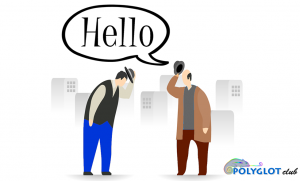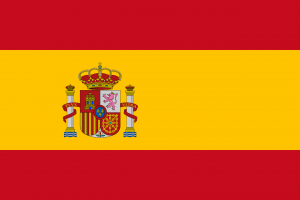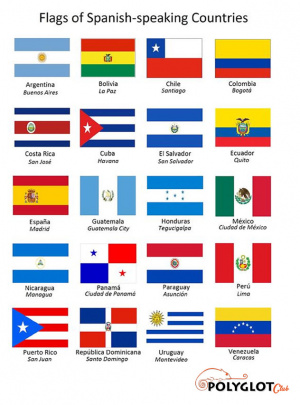Language/Spanish/Vocabulary/How-to-Say-Hello-and-Greetings
< Language | Spanish | Vocabulary
Jump to navigation
Jump to search
Rate this lesson:
How to greet in Spanish Language (any Spanish speaking country)
¿Qué tal, amigos? 😃
➡ In today's lesson you will learn how to greet in Spanish.
Do you want to learn how to greet in Spanish, weither you are visiting any of the following Spanish speaking country:
- Argentina
- Bolivia
- Chile
- Colombia
- Costa Rica
- Cuba
- Dominican Republic
- Ecuador
- El Salvador
- Equatorial Guinea
- Guatemala
- Honduras
- Mexico
- Nicaragua
- Panama
- Paraguay
- Peru
- Spain
- Uruguay
- Venezuela
Greetings are an important part of any language because they allow you to connect and communicate with others.
If you’re planning a trip to the country or are trying to learn Spanish, keep reading to discover some of the most important greetings.
Let’s get started! 🤗
Greetings
| English | Spanish | Spanish speaking countries |
|---|---|---|
| morning greeting | Buenos días | all |
| afternoon and evening greeting | Buenas tardes | all |
| nighttime greeting | Buenas noches | all |
| informal greeting | Hola | all |
| how are you? spoken to one person, formal | ¿Cómo está? | all |
| how are you? spoken to one person, formal | ¿Cómo está usted? | all |
| how are you? spoken to one person, informal | ¿Cómo estás? | all |
| how are you? spoken to a group of people | ¿Cómo están? | all |
| how are you? spoken to a group of people | ¿Cómo están ustedes? | all |
| rely to Cómo está, Cómo está usted, Cómo estás, and Cómo están | Bien | all |
| rely to Cómo está, Cómo está usted, Cómo estás, and Cómo están | Muy bien | all |
| rely to Cómo está, Cómo está usted, Cómo estás, and Cómo están | Bien, gracias | all |
| rely to Cómo está, Cómo está usted, and Cómo estás | Estoy bien | all |
| how are you? informal | ¿Qué tal? | all |
| how are you? informal | ¿Qué tal andas? | all |
| how are you? informal, "what's new" | ¿Qué hay de nuevo? | all |
| how are you? informal, "what's new" | ¿Qué hay? | all |
| how are you? informal, "what news do you bring" | ¿Qué novedades traes? | all |
| how are you? informal, "how's it going?" | ¿Cómo lo llevas? | all |
| how are you? informal, "what's happening", used in Spain [spa-cas] | ¿Qué pasa? | all |
| how are you? informal, "what happened", used in Mexico and Cuba [spa-ame] | ¿Qué pasó? | all |
| morning greeting, spoken in Argentina and Costa Rica [spa-ame] | Buen día | all |
| informal greeting, spoken in Spain [spa-cas] | Buenas | all |
| how are you? informal, spoken in Mexico [spa-ame] | ¿Qué onda? | all |
| how are you? informal, spoken in Mexico [spa-ame] | ¿Qué hubo? | all |
| how are you? informal, spoken in Mexico [spa-ame] | ¿Qué húbole? | all |
| how are you? very informal, spoken in Mexico, Central and South America [spa-ame] | Quiubo | all |
| how are you? very informal, spoken in Mexico [spa-ame] | Quiúbolas | all |
| how are you? very informal, spoken in Colombia [spa-ame] | Quiay | all |
| how are you? very informal, spoken in Venezuela [spa-ame] | Epa | all |
| how are you? very informal, spoken in Venezuela [spa-ame] | Épale | all |
| how are you? very informal, spoken in Costa Rica [spa-ame] | Diay | all |
| how are you? very informal, spoken in Costa Rica [spa-ame] | Idiay | all |
| greeting used in the southwest United States [spa-ame] | Buenos días le dé Dios | all |
| greeting used in the southwest United States [spa-ame] | Buenos días te dé Dios | all |
| greeting spoken to a person after a long or unexpected absence, "what a miracle!" | ¡Qué milagro! | all |
| welcome greeting spoken to a man | Bienvenido | all |
| welcome greeting spoken to a woman | Bienvenida | all |
| welcome greeting spoken to a group of people | Bienvenidos | all |
| welcome greeting spoken to a group of men | Bienvenidos | all |
| welcome greeting spoken to a group of women | Bienvenidas | all |
| Informal greeting | ¿Qué tal? | Mostly used in Spain |
| Informal greeting | ¿Qué pasa? | |
| Informal greeting | ¿Qué pasó? | |
| Informal greeting | ¿Qué onda? | This one is popular in Central America and sometimes concluded with güey or güero (“dude”). |
| Informal greeting | ¿Qué más? | |
| Informal greeting | ¿Qué hay? | |
| Informal greeting | ¿Qué hubo? | |
| Informal greeting | ¿Qué hay de nuevo? | |
| Informal greeting | ¿Qué es lo que hay? | Dominican Republic |
| Informal greeting | ¿Qué es lo que? | Dominican Republic |
| Informal greeting | Qué lo que? | Dominican Republic |
| Informal greeting | ¿Qué cuentas? | |
| Informal greeting | ¿Qué me cuentas? | |
| Informal greeting | ¿Qué nos cuentas? | |
| Informal greeting | ¿Qué haces? |



